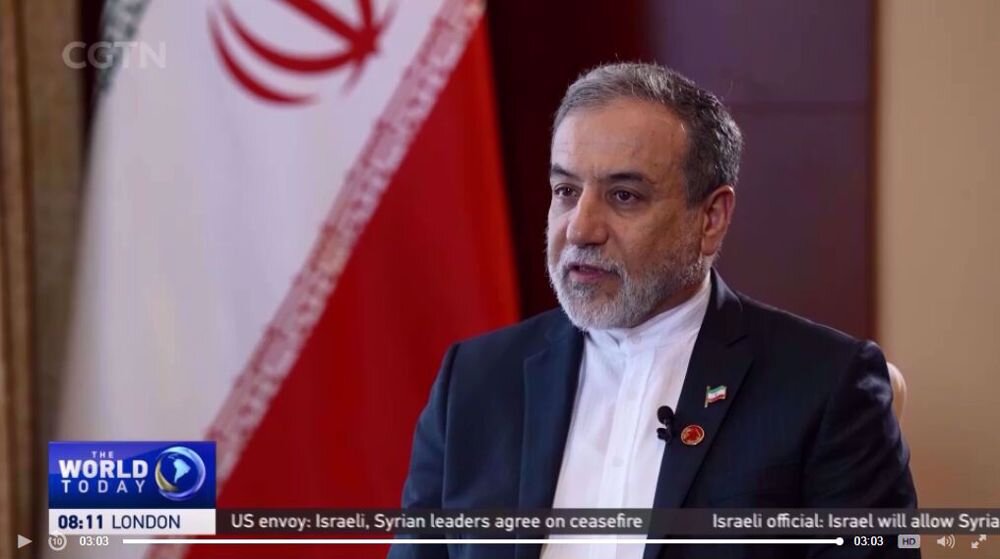Iran never desires war but remains ‘prepared’ as truce is ‘fragile’: Araghchi

TEHRAN – Iranian Foreign Minister Abbas Araghchi has said Tehran was left with no choice but to defend itself against unprovoked Israeli aggression, emphasizing that while Iran never desired war, it remains fully prepared for any scenario as the current pause in hostilities remains fragile.
Speaking to China’s CGTN, Araghchi reaffirmed Tehran’s right to self-defense in response to Israeli aggression and underscored that diplomacy remains the only viable path forward for resolving tensions over Iran’s nuclear program.
He stressed that the confrontation was not a mutual conflict but a one-sided assault, and warned that Israel’s track record makes any truce inherently unreliable.
“We stood firm on our own soil, defended our country with courage, and ultimately forced the aggressors to halt their operations and request an unconditional ceasefire — which we accepted.”
“We are fully aware that no ceasefire involving that the Zionist regime can be relied upon, given its track record. That’s why we remain vigilant and ready to respond if it is violated.” He reiterated that Iran had no desire for war.
“We didn’t start this conflict, and we don’t wish for it to continue — but we are fully prepared for any scenario.”
‘Iran waiting for real U.S. commitment to diplomacy’
When asked about Iran’s hesitation to resume nuclear talks with the United States, Araghchi explained that Tehran is waiting to see genuine political will from Washington.
“We are still evaluating the situation because we need to see real commitment — not just words — from the U.S. We need to know they are serious about a win-win solution. Our nuclear program is strictly peaceful, and we are fully confident in that. We’re also ready to share that confidence with others, but only through meaningful negotiations.”
He pointed to the 2015 nuclear deal, the Joint Comprehensive Plan of Action (JCPOA), as a historic diplomatic achievement.
“We successfully reached an agreement with the P5+1 in 2015. It was celebrated worldwide as a major diplomatic success, and we upheld our commitments. But the U.S. unilaterally withdrew — a deeply regrettable move. What we’re witnessing now is a direct consequence of that decision.”
‘Diplomacy is the only path forward’
Araghchi expressed cautious optimism about reviving the nuclear deal, but only if Washington abandons its military approach.
“There is still a chance for a negotiated agreement — but only if the other side shows real intent. The military option must be completely off the table. We need to move forward through diplomacy.”
He stressed that the recent Israeli-American strike on Iranian nuclear facilities proved the futility of military solutions.
“Their attack clearly demonstrated that a military approach cannot dismantle Iran’s nuclear program. Only a diplomatic resolution will work — and that depends on them ending their militaristic policies and compensating Iran for the damage. Only then will we be ready to re-engage in negotiations.”
‘SCO is a platform for global south empowerment’
Turning to regional alliances, Araghchi praised Iran’s full membership in the Shanghai Cooperation Organization (SCO), saying it reflects Tehran’s commitment to building new international partnerships outside of Western-dominated frameworks.
“We attach great value to the SCO. It offers a platform for countries of the Global South to claim their rightful place in the international order.”
He noted the increasing interest of other countries in joining the organization, describing it as a positive trend driven by a shared vision for addressing security, economic, and cultural challenges differently from the West.
“We are grateful to the SCO Secretariat and all member states who condemned the aggression by Israel and the United States, particularly the attack on our nuclear infrastructure.”
‘Strikes on nuclear sites a violation of international law’
Finally, Araghchi condemned the targeting of nuclear facilities as a grave breach of international law and a threat to humanity.
“Any form of military aggression violates international law and the UN Charter. But attacking nuclear sites is an even more serious crime — one that is absolutely forbidden. It poses catastrophic environmental risks for humanity.”
He concluded by expressing gratitude for China’s strong support and solidarity, especially its condolences to the Iranian people, including women and children harmed in the attacks.
Leave a Comment